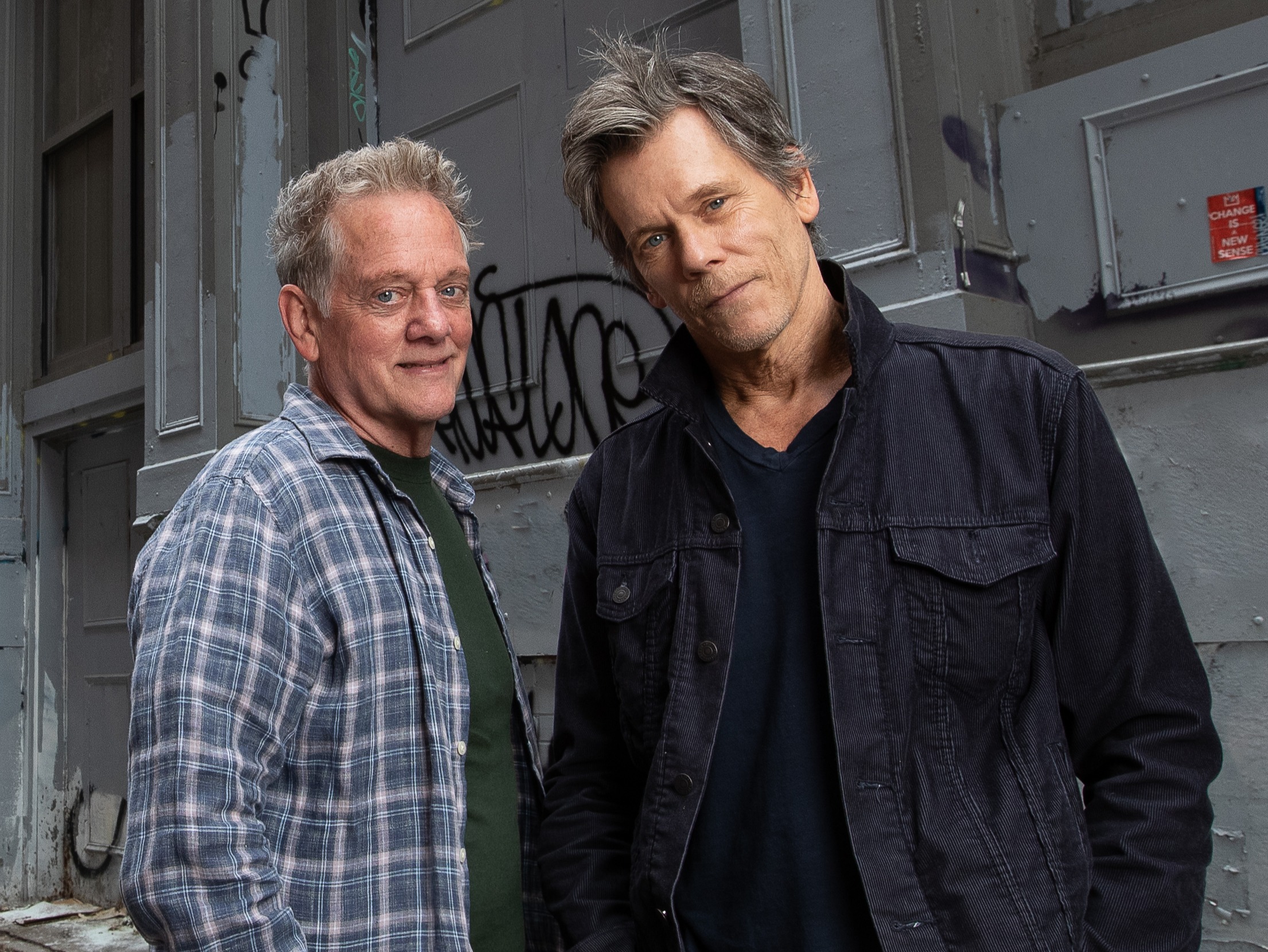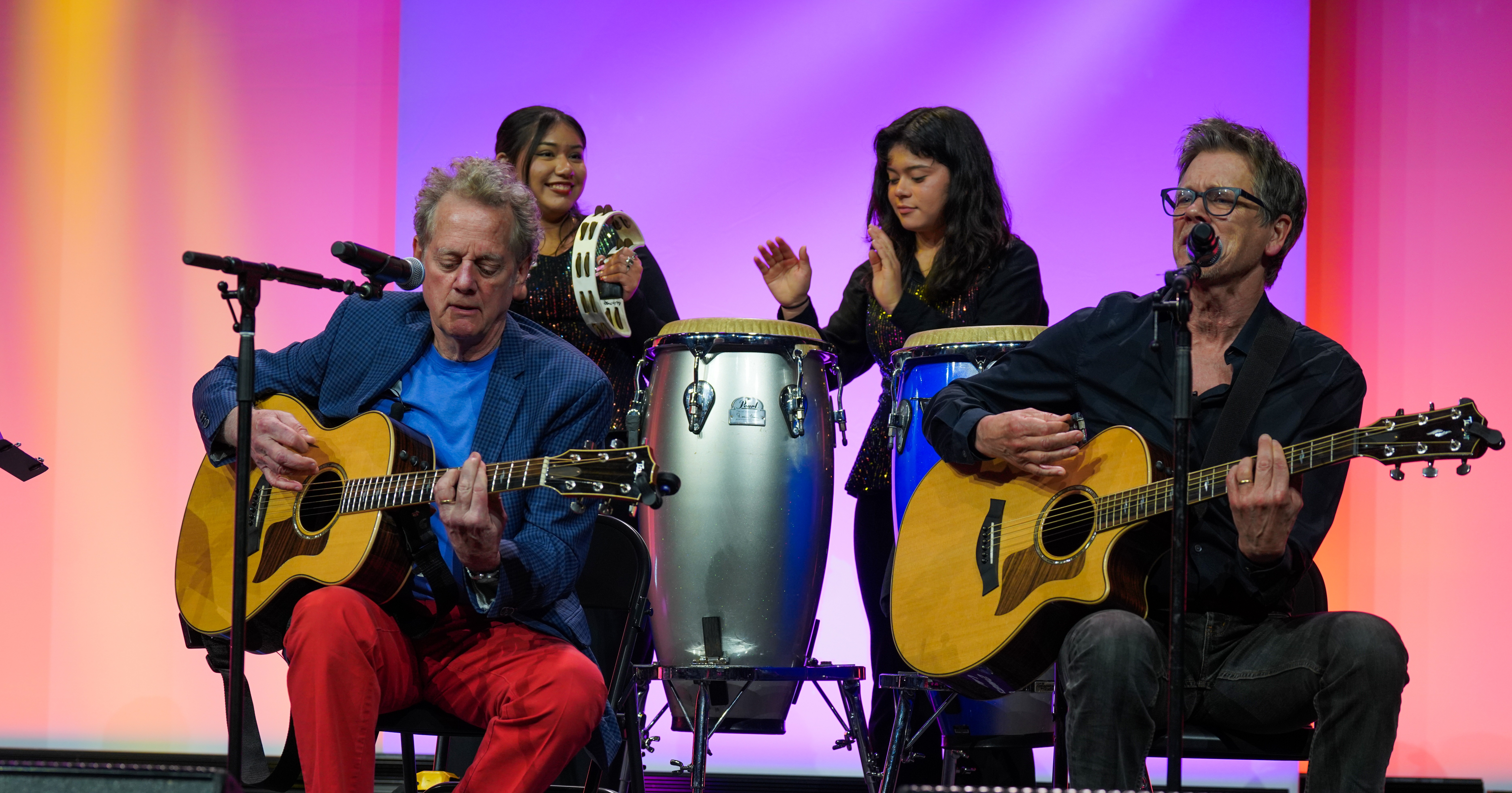Kevin Bacon is known for his many acting roles, and Michael Bacon is an award-winning composer and college instructor. Together, the brothers are recognized for their distinctive musical sound and advocacy for arts education. They discussed that passion with audiences during NSBA’s Annual Conference.
July 14, 2025

PHOTO COURTESY OF THE BACON BROTHERS
Actor and director Kevin Bacon and his brother, Michael Bacon, an Emmy-winning composer and associate professor of music at Lehman College in the Bronx, New York, have released a dozen records together as The Bacon Brothers and performed their music on stages worldwide.
Musicians and philanthropists, the brothers are passionate about arts education. They discussed the importance of the arts as an integral part of every child’s development and education as the keynote presenters during the closing General Session of NSBA’s Annual Conference in Atlanta in April.
During their keynote, Kevin and Michael shared that their late mother, Ruth Holmes Bacon, instilled in them and their four sisters a love of the arts while growing up in Philadelphia, and constantly provided opportunities to encourage their creativity. A lifelong educator and justice advocate, Ruth Bacon has been recognized for designing influential educational programs to benefit children and families, including the Philadelphia School District’s Parents Cooperative Nursery. She was a leader in the opening of Philadelphia’s Please Touch Museum, a play-based, interactive experience for young people. Additionally, she played a pivotal role in establishing the Family Resource Center at the now-closed Graterford Prison, a program to promote meaningful connections between children and their incarcerated fathers.
During a question-and-answer session with NSBA Executive Director and CEO Verjeana McCotter-Jacobs, The Bacon Brothers discussed how their educational journeys and development influenced their professional careers.
The keynote presenters also performed two musical numbers that showcased their signature blend of folk, rock, soul, and country music. On the number “Old Bronco,” they were accompanied on percussion by two members of the San Bernardino Teen Music Workshop, the student group that also performed during the General Session.
 THE BACON BROTHERS PERFORM WITH TWO STUDENTS FROM THE SAN BERNARDINO TEEN MUSIC WORKSHOP.
THE BACON BROTHERS PERFORM WITH TWO STUDENTS FROM THE SAN BERNARDINO TEEN MUSIC WORKSHOP.
PHOTO CREDIT: NSBA
Your mom was a preschool teacher who went on to design and implement educational programs for children and families. How did her training and approach to education shape your learning experiences?
Kevin: The first school that I ever went to was the school that she started in the Schuylkill Falls housing project. Our mom instilled in us this idea of always trying to create. She was really not into buying things, almost to a fault. Sometimes, I’d think to myself, ‘Man, can I just get a toy?’ But she’d say, ‘If you want a sword, go find a stick and make one. And if you want a Halloween costume, make it.’ That’s just the way she was. She later stopped teaching nursery school and began working at the Community College of Philadelphia, where she taught early childhood education.
Michael: In the last couple of years, a lot of people have become very interested in her career. At Graterford Prison, a maximum-security prison in Pennsylvania, she worked with inmates to establish a cooperative nursery school. Following her death (in 1991), some of the guys had a memorial service for her at the prison. It was truly unforgettable.
Kevin: Through SixDegrees.org, which is my charity, we started an initiative that, unbeknownst to us, our board of directors named Ruth’s Room. The idea behind the initiative is to identify unused spaces, wherever they may be, and transform them into areas where people can create music, art, or engage in after-school study, among other activities. The first Ruth’s Room opened earlier this year at the School District of Philadelphia’s Juvenile Justice Services Center, serving as a music space. Students can take music lessons, play instruments, write songs, program beats, and there’s a recording studio.
Michael, as an educator who understands the importance of arts education, what trends do you notice among the students in your classes? What are their needs?
Michael: The vast majority of my students are first-generation college students. If I can advocate for one thing, it’s that I hate online teaching. I find it horrible. Yet, I do it. I have a three-hour class on Wednesday nights that I must teach online. I don’t want to imply that everything is great because that’s simply not true. In the classroom, if someone is sitting in the back and not engaged, if you truly deliver a compelling class, you’ll bring them in. I teach about 27 classes per semester, and I have roughly 10 that are complete home runs where everybody gets involved, which leaves another 17 that vary in quality and aren’t as strong. My goal as a teacher is to make every class the best. I never expected to become a teacher. I wanted to be a rock and roll star, but teaching is a wonderful thing to do. I love my school. I love my students. As all of you know, and your teachers know, teaching can be tough. But those little times that you get something back are so wonderful.
Michael, if you could create a musical score for a film about today’s schools and the challenges students face, what kind of music or themes would you include?
Michael: Sorry for getting back on my soapbox, but here’s the problem with music today: digital technology, which I teach and have been using for years and years. It’s wonderful. The first record I made cost $25,000 in the late ’60s. Today, that would likely cost $500,000. So, digital technology has enabled everyone to participate in the market. The problem, for me, is that when you do something digitally, every other person in the world who has bought a sample library has exactly the same samples to use. So, I’m a big believer in live instruments because if I take my cello and combine some notes in a certain way, add my own emphasis and approach, that sound has never been played exactly that way before and will never be played that way again. It’s unique.
To shift the conversation a bit, sometimes a parent will approach me and say, ‘My son or daughter is really interested in music. Can you give me some advice?’ If the son or daughter comes to me, I’ll tell them to find out what makes them different from everybody else and become good at that. Develop that person.
What would you share with school board members as they consider the arts in education and the competing interests they must weigh?
Kevin: Education is essential for living a fulfilling and safe life, finding opportunities, and moving ahead in life and the world. This is not a new idea. You don’t need to hear me say that. We strongly believe that arts education should be an integral part of a child’s educational experience.
Even if they don’t end up becoming an actor, musician, dancer, or artist, at least they’ve gotten the chance to experience this. And I think that when there’s a lot of pressure on kids, especially when they’re caught in situations that they just can’t get away from, and it’s here, and here, and here, and here, having access to the arts allows them to pick up an instrument or a piece of paper and just put everything else aside and discover what they can create.
(This interview has been edited for length and clarity.)